Schoor van der, de Boer. Wilke
Captain Wilke Van der Schoor de Boer.
His name is one of those Dutch names that can get any foreigner in a muddle. It is double barrelled but the Dutch do not use the – in names. To split it up properly:
Wilke is the first name.
The first part of his last name belonged to the grandfather of his mother: Dieuwertje van der Schoor.
The 2nd part of his last name belonged to the grandfather of his father: Wilke de Boer.
They merged the two last names, hence his father Heijo (born in 1829 in Bunde / leer Germany) got the long last name “Van der Schoor de Boer”. (f)
Because a name like this does not fit in any passport or database properly, he will have gone through life at times with only part of the name or an abbreviation, which makes it very difficult to trace his life, especially for the period after he left the Holland America Line.
What we know is the following:
He was born on 10 July 1861 in the Municipality of Wildervank, in the town of Stadskanaal. This town is located in the very far North East of the Netherlands. His father’s occupation was listed as being a carriage driver, and his mother was Antje Meelfs Groeneveld.
The area he was living in produced a large number of sailors. Family’s had large numbers of children for whom there was no work locally and as a result a large shipping industry developed in the area. The nearby town of Veendam was in the 19th. Century one of the most important shipping centers in Europe and that while being a land locked port. Lloyds Register which classifies large numbers of merchant navy ships opened its first foreign office in this town.
Van der Schoor must have attended some local maritime school and then went to sea. Most of the sailing ships which were home to the area belonged to Captain / Owners (See the biography of Captain Deddes also on this website) and unless you were a captain, there are hardly any records.
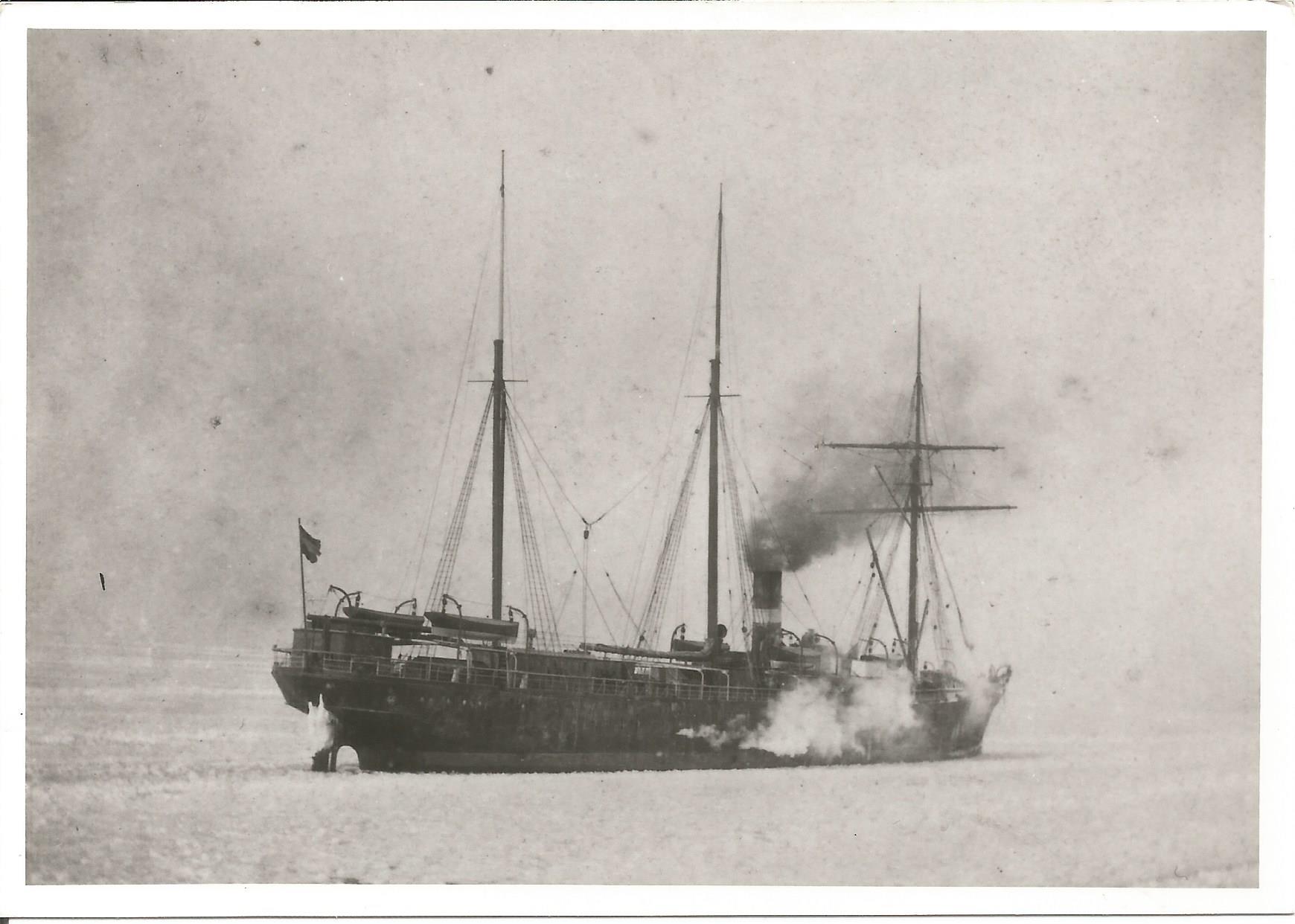
The ss ‘W.A Scholten’ seen here on a winters day. This ship and her sister the ss ‘P Caland’ were the two ships bought by Holland America when the company went public in 1873 and public funds came in.
After some years at sea, at the age of 21, he joins the Holland America Line as a 4th. Officer on 15 December 1882 and is assigned to the ss ‘W.A Scholten’. This ship did not have a DAM name but was named after the major investor of the company when it went public on 18 April 1873, Mr. W.A Scholten. This man was an industrialist from the north of the Netherlands, who had made his money in starch. (The company still exists under the name of Royal Haskoning)
In 1887 he is promoted to chief Officer and it is believed that he then settled down in Amsterdam as he now served on ships mostly sailing from Amsterdam. Holland America had agreed to a 10 year sailing contract with its ships from Amsterdam to prevent shipping company’s based in Amsterdam from opening a service to New York from Amsterdam. In those days travelling from Amsterdam to Rotterdam was still a considerable journey and several captains and other officers settled in Amsterdam for these periods of assignment.
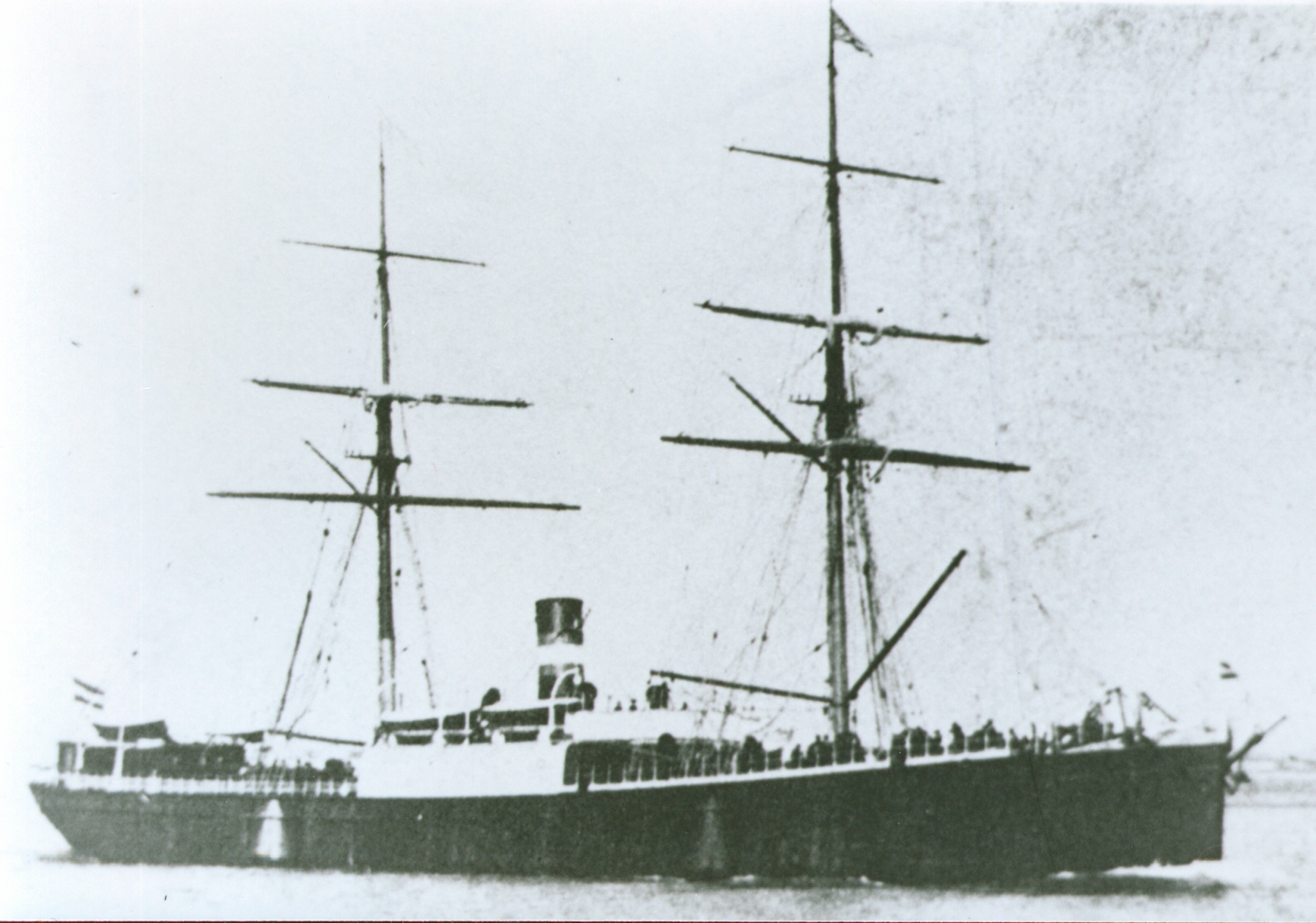
The ss ‘Leerdam’ (I) bought by Holland America in 1882.
Then on 07 May 1888 he leaves his last ship, the ‘Leerdam’ (I) as Chief Officer and only returns a year later on 29th. of August 1889 as 2nd officer on the ss Edam (II). There is no company record which indicates what he did in those 15 months.
On 15 December 1892 he marries at Vlissingen (Flushing) Teuntje Adriana Adamina Henrietta Stasse ((Born 27October1861 at Dordrecht). She was a daughter of Hendrik Leonardus Stasse (Sea Captain) and Adriana Adamina van Hemert. In 1892 he is promoted to Captain of the ss ‘Dubbeldam’ which sails from Rotterdam and he moves officially to Rotterdam on 17 May 1894. There on 14 May 1894 a son Hajo Albert van der Schoor de Boer had been born.
Note: A son of Hajo also went to sea and became later Captain with the Rotterdamsche Llloyd. While in command of the ss ‘Soekaboemi’ he was torpedoed by the U 441on 27 Dec. 1942 while in convoy, sailing on from Glasgow to New York. The ship had already been hit once by the ‘U 356’ and then the job was finished by the ‘U 441’. One crewmember died but 65 crew and four passengers including the captain were saved.
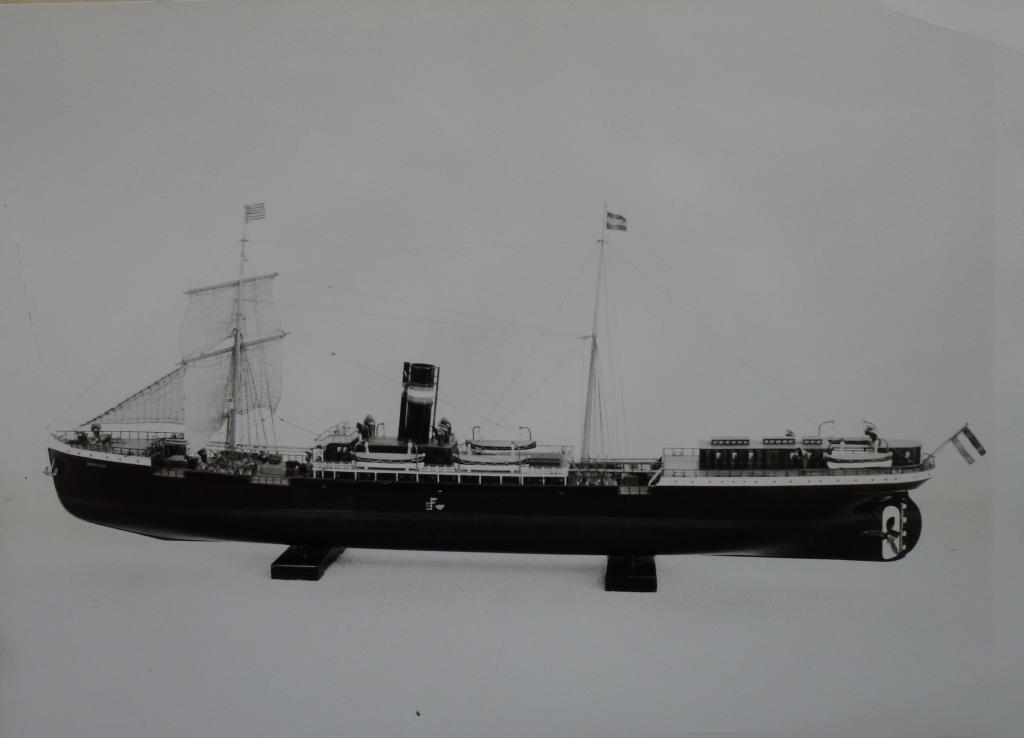
The ss ‘Dubbeldam’. Due to her short career with Holland America there are no photos of the ship in Holland America Line colours. Hence here a photo of a ships model which is in the collection of the Rotterdam Maritime Museum.
In the meantime he sails as Captain but also as Chief Officer. This was caused by the fact that the two ships ‘Didam’ and ‘Dubbeldam’ were not successful on the north Atlantic service and were sold after periods in lay up. Which meant a surplus in Captains and thus the youngest ones had to step down again.
On the 18th. of August 1899 he resigns from the company. The same day a 2nd child is born Wilke Arnold in the town of Doorn in the Netherlands. (ED: it is it is fair to assume that there must be a relation between the child being born and the mother being affected by the child birth as she passes away on 23 September 1899.
In the mean time two other children had been born, while living in Rotterdam (Wilke and Leferdus but both had died the same day in childbirth) (f)
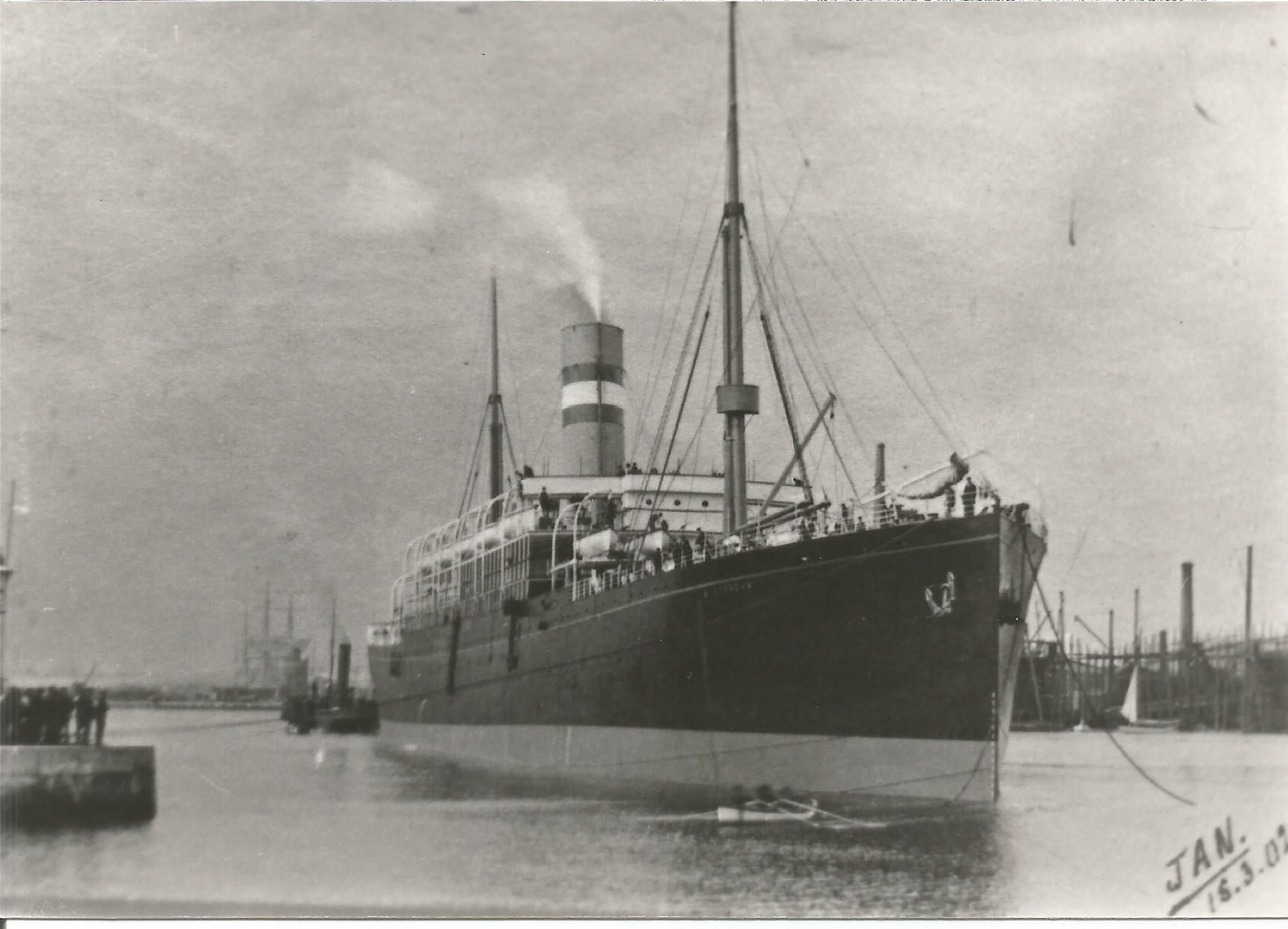
The ss ‘Statendam’ (I) this was the latest newbuild of the company, and as Van Der Schoor was now by far the most Senior Chief Officer he followed the Commodore of the company to collect the ship from the shipyard in Belfast. This photo was taken shortly before the ship sailed to Rotterdam.
He does not return to Holland America but is noted to have gone to Sunderland, England on 11 October 1899. This coincided with the building of the steamship ‘Zeeburg’ of the “Stoomvaart Maatschappij Amsterdam*. Which was launched at a local yard there on 03 December 1899. The local newspaper indicates that Captain Van der Schoor de Boer will be the assigned captain.
This is repeated in 1901 when on September 12, the steamship ‘Voorburg’ is launched at the NSM in Amsterdam and again Captain Van der Schoor is appointed as the designated master. (d) He remains with this ship at least until 1906 but most likely for a longer period as he is returns to Rotterdam on 16 September 1907 still listed as a ships captain. (d)
In January 1905 he expresses his appreciation that he received a silver medal for maintaining a recording log for Magnetic compass observations as part of a competition which was ran by the “Commission of Scientific Seafaring”. This was the 2nd medal he received as there was also one for the period 1900 -1901.
In April 1905 he is mentioned in the Rotterdam newspaper for donating a Barribal (sort of bear) and a raccoon to the local Zoo. In December he donates a “Musch valk” or small falcon native to the Dutch East Indies. (d)
It is believed that he sailed on the ss ‘Voorburg’ until he went to the USA as in November 1910 an official complaint is handed in around that time at the Dutch Board of Inquiry by 3 sailors. He is accused of drunkenness and supplying out of date food. Both accusations turn out to be not true and the case is dismissed. (e)
But the 1907 US census notes him as living in Savannah, Chatham, Georgia, so its unclear where he exactly as between 1907 and 1910. Now his career takes a totally different course. On 18th. of April 1908 he is appointed as Vice Consul of the Kingdom of the Netherlands at Savannah.
Travelling with him is his new wife Derkjen Johanna ter Keurst who had been first married to his brother in law who had passed away in 1906. (**) Captain Wilke moves to Savannah for consular work in September 1909. (On 15 March 1910 the Dutch Newspapers advise that Consul Wilke van der Schoor de Boer has been given an honorary discharge from his function as Consul in Savannah).
By that time he has moved to Charleston, South Carolina and on 14 February 1909 his job is gives as Vice Consul and Expert. An ‘expert’ in those days was a person who went around ships estimating the cost of sustained damages for Insurance company’s. (Other Holland America Line captains such as Deddes and Landman had gone this way as well). The Netherlands was at that time busy with expanding their consular network and if there was Dutchman in a preferred port location who had an official office, then the option was there to become Vice Consul. A (Vice) Consul was a person who helped stranded Dutch People, sorted out lost and damaged paperwork, acted as a Notary Public for Dutch internal Affairs, and recorded deaths and births. Also sailors who signed on in the port onto a Dutch Ship had to see the local Dutch Consul to get their seaman’s book stamped.
There are several entries in the arrival records of Ellis Island, coming from the Netherlands, 1917,1918, and 1920, so he must still have been close contact with the Netherlands, maybe for work, maybe for family reasons.
There is another record dated 22 November 1918, when he moves to New York still for consular work. There is an entry that his wife sails to New York on 03 December 1919, so she must have returned to Rotterdam sometime before. (d) Maybe to ensure the education of the 3 childeren.
In 1922 he is naturalized to American citizen but remains in New York. Then by 1930 he is noted to live at Palisades Park, Bergen, New jersey, USA.
He is still in New York when in December 1934 he is part of a party of Dutch dignitaries who attend the Dutch “Sinterklaas” (St. Nicolas) party on board the ss ‘Volendam’ (I). (d)
By 1940 his address is noted as 232 Grand Avenue Palisades, Park Bergen, New Jersey USA. The 1950 census indicates that he was lving in Hoboken in 1950 and then moved to San Francisco. He his son Hajo had settled down there after the 2nd World War and now his old father joined him.
Captain Wilke van der Schoor de Boer passed away on 14 Oct. 1952 at San Francisco at the age of 91. (d)
(*) She was a sister of Captain Arnoldus Paulus Stasse (1865 – 1906) who sailed for the Netherland Line (SMN) He Spends the majority of his time in the Dutch East Indies but settles down in 1902 in Deventer the Netherlands as he marries there on 23 January 1902 Derkjen Johanna ter Keurts.
(**) He passed away on 08 July 1906 .She had a son called Hendrik Leonardus (Henry) born on 20 March 1902.
With a special thank you to Mrs. April Hoeksema who provided some very good links to the American records pertaining to the Captain. (Her grand parents came over with the ss ‘Dubbeldam’ when Captain Van der Schoor was in command.
Sailing List: (b,c)
Date: Function: Ship: Wages and/or remarks.
15 Dec.1882 24th. Officer W.A Scholten
06 Jun.1883 3rd. Officer Schiedam
25 Sep. 1885 Dismissed on request (To make a sailing voyage for his exam)
Obtained Chief Mates license at Rotterdam in Dec 1885.
25 Dec. 1885 3rd officer Edam 40,–
26 Aug. 1886 2nd. Officer Edam 60,–
09 Apr. 1887 Chief Officer Edam 100,–
12 Oct. 1887 Dismissed due to illness
28 Nov. 1887 Chief Officer Amsterdam 100,–
04 Feb. 1888 Chief Officer Leerdam 100,–
07 May. 1888 Dismissed.
29 Aug. 1889 2nd Officer Edam 70,–
17 Nov. 1889 Temporary dismissed due to Illness
22 Nov. 1882 2nd Officer Edam 70,–
23 Jun. 1890 2nd Officer Edam 70,–
With a 15,– extra until cancellation
29 Mar.1891 Chief Officer Edam 100,–
16 Nov. 1891 Act. Captain Edam ???
28 Dec. 1891 Chief Officer Edam 100,–
14 Apr. 1892 Chief Officer Dubbeldam 100,–
15 Apr. 1892 Act. Captain Dubbeldam 150,–
22 Feb. 1893 Captain P.Caland
28 Oct. 1893 Captain on Standby and temporary dismissed.
13 Dec. 1893 Captain P. Caland
10 Jul. 1894 Captain Schiedam
25 Oct. 1894 Captain Didam
15 Jan. 1895 Captain P. Caland ( in lay up)
01 Feb.1895 Act. Chief Officer Spaarndam
10 Sep. 1896 Captain P. Caland
09 Feb. 1897 Act. Chief Officer Spaarndam
26 Apr. 1898 Captain Spaarndam
Note: this does not correspond with mustering book and also not with other captains sailing schedules.
16 May. 1898 Captain on Standby and temporarily dismissed
19 Jun. 1898 Via Vlissingen to Belfast assigned to the ss Statendam as Chief Officer
18 Aug. 1899 Dismissed on own request.
Then shows up on the sailing lists of the Stoomvaart Maatschappij Amsterdam
06 Dec, 1899 Captain Zeeburg
1901 Captain Voorburg
1906 – 1909 End of (sailing) career as the Captain emigrates to the USA.
Sources:
a. Photo: Unknown source but there is a similar photo held in the Archives of the Maritime Museum in Rotterdam.
b. Stamboek (Personnel Records) from the HAL archives as held by the Municipal Archives of the City of Rotterdam.
c. Piet’s Scheepvaart Index for ships outside the HAL.
d. Mr. E.A Kruidhof.
e. Raad voor de Scheepvaart. Ruling dated 15 April 1911
f. Mrs. April Hoeksema Portage, Michigan.
Last updated: 29 March 2023
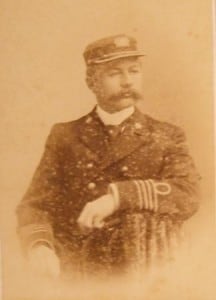

Leave a Reply